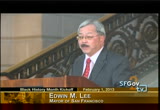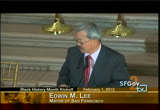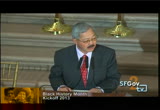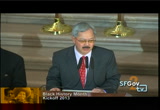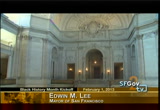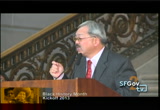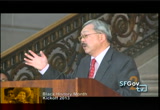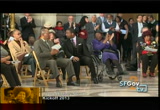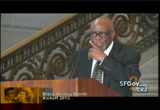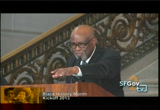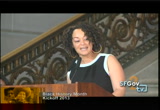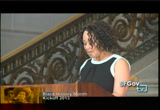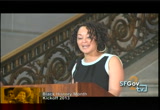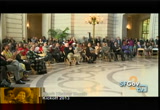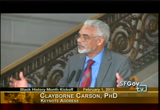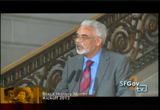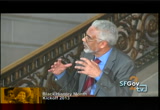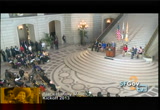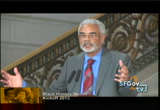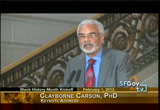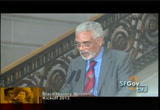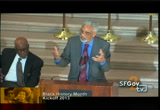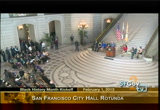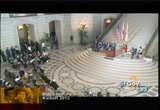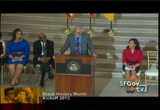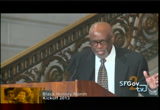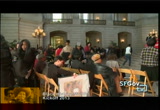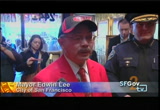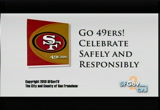tv [untitled] February 1, 2013 6:30pm-7:00pm PST
6:30 pm
but i also said something else, too, that i want you to continuously know the way i have attempted to manage this great city of ours for everybody. that is, i'm not shy about asking for help. and when it comes to the challenges we have in the african-american community, we need help. and i have been deliberately assembling a very important group of people who are going to help me get the job done. and you've seen some of these people already. they are malia cohen, london breed at the board. they have to face all the different politics. but i know they're going to be great partners with me because we've got the right objectives to happen. we want everybody included in the city. we have naomi kelly, harlan kelly, mohammed nuru, rhonda
6:31 pm
simmons heading upstreamly important departments. and i've got to say this. if we can't get the job done with these people in these important positions or some tremendous progress, i don't know where else to look because this is a great start. yes. (applause) >> but we also have tremendous help from people who are helping us create the policies and the accountability in all the different departments. melva davis, kim brandon, willie adams at the port, chuck collins, [speaker not understood], the reverend amos brown, denise tyson, linda richardson, sonya harris, patricia thomas, veronica honeycut, these are just the names of a few of our commissioners who are heading up those very important divisions
6:32 pm
of our city. and they are joining with me and with the supervisors and with the department heads to do what mrs. obama asked us to do. whenever we occupy these public positions throughout the city or throughout the state or throughout the nation, we do the right thing, we keep the doors of opportunity open and enriched for everybody else. and we're already seeing it happen. yesterday i was at the luncheon for the boys and girls club, wonderful, wonderful entity that's reaching out to all of our young high school kids and make sure they're motivated to go to college. you should have heard them talk about their futures. you should also hear them ask for our help, because i know as much as anybody else that our kids will inherit the good things that we do.
6:33 pm
they will also inherit the things that we fail to do. and i'm about making sure that we fail less in the things that we're obligated to do for our generations. that's why i'm investing in education. personally, and with all of my administration, i personally adopted the 12 middle schools in this city to make sure that the truancy goes down, is not eliminated, that the kids who are in our middle schools have the hope, the hope that we're generating when they were in elementary school, involved with their parents, have the same kind of guidance and support as they get to critical decisionses about whether or not they see the vision of living in the city and going to college and getting the kind of education and skill sets to take on these great jobs that we're creating. i want to make sure -- yes. (applause) >> i want to make sure that our tech sf are training programs rhonda is heading up and so
6:34 pm
many others create the foundation at the skill sets to earn these new jobs. it's ecology jobs that we all see happening that pay very good salaries, that we're training people in bayview, in the western addition, in all of our city to make sure they have not only the good shots that they get those jobs as well. and that's why it's so important that all the companies in san francisco invest in our effort to create those 5,000 summer jobs, expose them to how to earn their money, not take some handout from somebody. earn their money so that they can have the respect of having a good paycheck and get used to it and get used to success. this is the story that we have to live up to. (applause) >> and it is all about moving forward for everybody.
6:35 pm
the intent of reenvisioning public housing is so that we can talk to each other about not recreating the story about generations of people stuck in poverty housing. it is about a vision that we agree to, that when we get our paychecks, when we earn those jobs, we move our families forward so that they stay in san francisco and that they are successful in being here in san francisco. that's what we're trying to build. i just got out of a critical hour with senator leno who has been so helpful at the state. and we talked about all of the programs that we need to make sure that we're investing in so that everybody in san francisco can succeed. this is absolutely critical. six months ago, senator leno and i were talking about how miserable the state was, how miserable fiscal cliff locally and federal government was. today, after his efforts, after
6:36 pm
the efforts with governor brown are succeeding, after our local efforts here with all the propositions to create a good foundation, we now have the ability to get to really deliver on the promises of a shared economy for everyone. and guess what? we're going to be on the move. we're going to get the job done. this is no longer talk about wishes of things to happen. we actually have the ability to get it done and whether it's at the port, at the housing authority, at the city administrator's office of public works, at the puc, it's no longer about the lack of resources. it's about the will to get everybody included and get jobs to everybody and get the condition for people to succeed. so, on this day -- (applause) >> it's not just a celebration. let's us unite and get this job done for everybody. let's make sure we translate promises into real programs and reality so we can have more and
6:37 pm
more of our youth say to us, i'm going to be here, i'm going to get the jobs, i'm going to invest in myself, and then i'm going to be the mayor of san francisco. thank you very much for being here today and celebrating. (applause) >> and as mayors do, got a proclamation. al, with all your great leadership at the culture center and your support, this is the proclamation declaring officially black history month here in san francisco. (applause) >> thank you, mr. mayor. i was just reminded that we've got to be out of here by 1 o'clock because there is a wedding up on the balcony so we have to move because we've got to get to the real keynote speaker, dr. carson here. there are a couple people i do want to mention.
6:38 pm
we have visiting with us today gideon lustig who is the deputy general counsel from the consulate general of israel is with us today. mr. lustig, welcome. (applause) >> and the mayor and ms. kelly both spoke about public housing. appropriate to that, we have with us today members of the public housing tenants association board of directors, ms. joyce armstrong, neola gans and deirdre smith from the public housing tenants association board of directors. we want to welcome them. p (applause) >> and last but not least, ms. jones from the -- >> [inaudible]. >> the department of aging, ms. jones from the department of aging is with us today. i'm sorry. (applause) >> wanted to make sure i got that one in. with that, i'd like to hastily call forward cheryl smith who
6:39 pm
has been a tremendous supporter of the society who will introduce our keynote speaker. cheryl. (applause) >> good afternoon, everybody. and happy black history month. i have the great pleasure of introducing today's keynote speaker. we are fortunate to have a speaker whose experience and background exemplifies african-american history. he is the general ed orial advisor to the king legacy, a professor of history, and founding director of the martin luther king, jr., research and educational institute at stanford university. during 2009, he also served as the king distinguished professor at morehouse college and the first executive director of that institution's king collection. (applause) >> thank you. during his undergraduate years at ucla he participated in civil rights and anti-war
6:40 pm
protests and many of his subsequent writings reflects his experiences by stressing the importance of grassroots political activity in the african-american freedom struggle. his first book, end struggle snick and the black awakening of the 1960s remains a definitive history of student nonviolent coordinating committee, one of the most dynamic and innovative civil rights organizations of our time. he served as senior advisor for a 14-part award winning public television series on civil rights entitled "eyes on the prize." i know we all remember that. (applause) >> his recent, his recent publication, the book, martin's dream: my journey and the legacy of martin luther king, jr., a memoir about his transition from being a teenage participant in the march on washington to becoming a
6:41 pm
historian and an educator and, of course, if you sign up for a membership you can get that book today. it's here. in 1985 he was invited by coretta scott king to direct a long-term project to edit and publish the definitive multi-volume edition, the papers of martin luther kindergartenv, jr. those papers include many of king's speeches, sermons, correspondence, publications, and unpublished writings. in addition, he has written or coed ted numerous other works based on those papers. * he collaborated -- now, this is really significant. he collaborated with the roma design group of san francisco to create the winning proposal in an international competition to design the national king memorial in washington, d.c. (applause) >> all right. among his many honors and awards, he has received the honorary degree he received in
6:42 pm
2007 from more house college, has special meaning to him because it made him part of the morehouse men, which includes both martin luther king, jr. and senior. he has lectured at more than a hundred universities and colleges throughout the united states as well as internationally. he has lectured -- he has also spoken at many -- on many national television and radio shows. he is married to susan ann carlson who is in the front row there. please join me in welcoming dr. claiborne carlson. (applause) >> good morning, everyone. actually, it's afternoon now. i feel, first of all, honored to be here and thanks so much
6:43 pm
to all of you. this is a special event for me to be included in it is really an honor. even though i must say i feel a bit of pressure now that i know that if i speak too long i'll be holding up a wedding. [laughter] >> so, but let me just start by saying -- recognizing the significance of this day. one of the things that hasn't been mentioned, which really should be mentioned, is that february 1st is the anniversary of the first student sit-in in 1960. some of you know that fourteen agers in greensboro, north carolina in their first year of college launched a wave of sit-ins. and the fact that these were teenagers calls attention to the unique contribution of
6:44 pm
young people to the struggle. i believe that -- (applause) >> we should particularly bring that to mind when we honor martin luther king, because one of the things that i try to stress, even though i've devoted decades of my life to the study of martin luther king, we would not be honoring martin luther king if not for rosa parks. rosa parks made martin luther king possible. (applause) >> and i believe that those four students in greensboro also made the accomplishments that we he attribute to martin luther king as a symbol of the movement. martin luther king understood that many of the things that we attribute to him would not have been possible without the grassroots of the struggle. and that brings me back to the book that i've written about the last 50 years. when i was a teenager, a 19
6:45 pm
year old, i went to the march on washington. and right before going, i met some of these young activists who are associated with the student nonviolent coordinating committee. i must say that that affected the way in which i viewed the march. like everyone else, i wanted to see what martin luther king's concluding speech would be. but i was also interested in the speech of john lewis who was the chair of the student nonviolent coordinating committee. just days before the march, i had met one of the snick activists at a conference. his name was stokely car michael. and from that time on, i understood that when we refer to martin luther king as the leader of the movement, we're also referring to him as a symbol for something much larger than any one person. i think that that's so
6:46 pm
important for us to understand as we teach young people about the meaning of martin luther king on martin luther king day, that they understand that they -- their generation is what made the movement possible. that the people who staged the sit-ins, the young children in birmingham, they made the movement possible. and i think that this is a extremely important as we commemorate martin luther king. now, also in the 50 years since the march on washington, some amazing things have happened, in my life and many of the lives of the people in this room. if someone had come to me at the march and said, guess what, in about a dozen years you'll
6:47 pm
be teaching african-american history at stanford university. i would have said, yes, and i'll be living on mars also. because many of you know that that was an inconceivable dream for a 19 year old at that point. or in two decades coretta scott king would call me and edit the papers of her late husband. or in three decades that i would be asked to join this team roma design right here in san francisco and design the king national memorial. and i would be going back to the mall where i was as a 19 year old as one of the 2 million people who were there for the first inauguration of president barack obama. and just a year later, a couple of years later, going back
6:48 pm
there to actually see the dedication of that memorial. all of these things would have been inconceivable in 1963. so, when i talk about martin's dream, what i'm really talking about is the expansion of all of our dreams, to include things that we might not imagine. and i guess my hope in doing the work that i do is that a young teenager today would have that same experience i have -- have had, of having the inimaginable -- unimaginable dream come true, things that you can't even imagine happening happen in their lives. i think that's what all of us up here are talking about when we mention martin's dream.
6:49 pm
one of the other things that i would say is that we need to properly recognize martin luther king as the world leader he is. i think it diminishes him to say he was an african-american civil rights leader. he was that, but he was so much more. he was the person who symbolized one of the great new movements of human history. when i go back and read his speeches, i'm particularly struck by the way in which he linked our struggle to struggles going on around the world. when he spoke, at the end of his life in memphis, and on the last evening of his life he's speaking to sanitation workers. and we have to remember that by calling him a civil rights leader, it doesn't quite
6:50 pm
encompass why he would be in memphis leading a strike of sanitation workers. but he performed the role that he had performed so often in his life. he inspired the strikers by telling them their labor struggle was connected to the historic labor struggle throughout the world. he said that despite the world being all messed up -- and this is a time of riots in many places -- he drew attention to the positive aspects of what was happening in the world, finding solace in this panoramic view of world history. and he went through all of world history and he said, if i had a chance to live at any point in the history of humanity, when would i choose? he went through the renaissance, he went through the reformation and all these different periods. and he said, if i had a chance to speak to the almighty and say, if you allow me to live
6:51 pm
just a few years in the second half of the 20th century, i will be happy. he acknowledged that it was a difficult time. the nation is sick. trouble is in the land, he said, confusion is all around. but he saw reasons for hope. i know that somehow only when it is dark enough can you see the stars. i see god working in this period of the 20th century in a way that men in some strange way are responding. and wherever they are assembled today, whether they are in johannesburg, nairobi, new york city, atlanta, georgia, or in memphis, the cry is always the same. we want to be free. this global vision of the world led me to see that the african-american struggle was only one aspect of a worldwide struggle which i have come to
6:52 pm
see as history's greatest freedom struggle. during the past 2-1/2 centuries, a majority of humanity has overcome major systems of oppression. notably inherited forms of status based on race, class, and generalder. and this transformation of the world's peasants, and many of us are not too many generations removed from peasantery, has been the most important achievement of the modern age. * and i have learned that this freedom struggle has been accomplished not simply through this transformation accomplished not simply through freedom struggles, but through the mass migrationses that brought my parents out of the south toward opportunities in the north. and with that great transformation of peasants into citizens is still going on right here in san francisco and in california.
6:53 pm
he chose to end, and i'll end, his great oration on that last day with his recognition that our struggle and his dream is still unfulfilled. i can imagine him, if he were invited back today as an 84-year-old, he would still be talking about the fact that his dream remains unfulfilled. i could see that his dream, however, still endures in the freedom struggles of our time and in all future freedom struggles. because we can still imagine him speaking of the day when freedom will ring in every village, in every hamlet throughout the world, and thereby speed up that day when
6:54 pm
all of god's children of all races will be able to join hands and sing in the words of the old negro spiritual, free at last, free at last, thank god almighty, we are free at last. thank you very much. (applause) [cheering and applauding] >> thank you, thank you, dr. carson. i'd like to -- we are right on time. the wedding is going to go on on time. and, so, we've done it again. let's give dr. carson another round of applause, please. (applause) as we mentioned on a couple of
6:55 pm
occasions throughout the program, we are in need and encouraging people to join, become members of the society. if you join the society today or renew a membership, you'll be able to get a free copy of dr. carson's book, martin -- the book is [speaker not understood]. he'll be in the light court signing, autographing books there and you can sign up for membership. there are refreshments in the south light court. again, i want to thank you for coming and being part of the kickoff ceremony. in your material there are other events going on throughout black history month. join in and participate in those events. thank you all very much for coming. (applause)
6:59 pm
with the weekly buzz. it's the first week in february, and we have things that won't break the bank, they for all free. this tuesday, february 5 is free admission date for top museums. the dm and the leg end of honor. and after the trip to the museum, take a trip to the zoo, and offering free admission to residents. enjoy seeing all species in their surroundings, and other activities throughout the day. and if you are a baseball fan, i have a giant treat for you, this saturday at&t
80 Views
IN COLLECTIONS
SFGTV2: San Francisco Government Television Television Archive
Television Archive  Television Archive News Search Service
Television Archive News Search Service 
Uploaded by TV Archive on

 Live Music Archive
Live Music Archive Librivox Free Audio
Librivox Free Audio Metropolitan Museum
Metropolitan Museum Cleveland Museum of Art
Cleveland Museum of Art Internet Arcade
Internet Arcade Console Living Room
Console Living Room Books to Borrow
Books to Borrow Open Library
Open Library TV News
TV News Understanding 9/11
Understanding 9/11